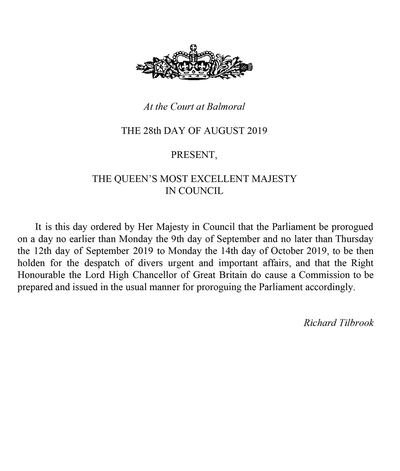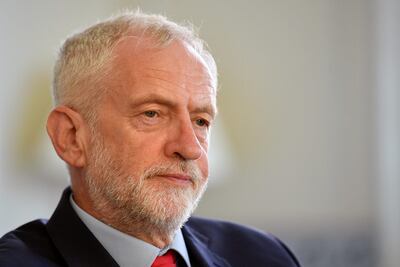What has happened?
British Prime Minister Boris Johnson announced plans suspend parliament from September 12 until the Queen’s Speech on October 14, when the Westminster body will officially begin a new legislative session. This is only two weeks before the October 31 deadline when Mr Johnson says the UK must leave the European Union with or without a withdrawal agreement. Critics, which include many MPs, economists and business leaders, say a no-deal Brexit will savage the UK economy and lead to a recession. Anti-no-deal MPs fear they will not have enough time between mid to late October to stop a hard Brexit happening.

Mr Johnson insists he is not trying to prevent MPs blocking a no-deal and says he simply wants to establish his domestic agenda with a formal programme of bills. The prime minister has vowed to renegotiate the divorce deal his predecessor Theresa May agreed with Brussels while doubters fear he is plotting a clean break. Talks with Brussels have not yet begun on how to amend the agreement struck late last year.
How can the suspension be stopped?
The government’s move has been met with fury by the many MPs who are opposed to Brexit. Critics have accused him of taking an undemocratic and unconstitutional decision.
“What the prime minister is doing is a sort of smash and grab on our democracy in order to force through a no-deal exit from the European Union. What is he so afraid of that he has to suspend parliament in order to prevent parliament discussing these matters?” opposition leader Jeremy Corbyn said. He has written to Queen Elizabeth, who is currently in the Scottish highlands, seeking a meeting.
The decision to close down the current session resets the calculations of Brexit rebels who had been seeking to use votes in September to exert influence over the process. As the Conservative Party does not have a majority in the parliament it cannot be sure of winning the day.
On Tuesday the main opposition parties came together and agreed they would try to thwart a no-deal Brexit through parliament. That plan to pass legislation relies on sufficient parliamentary sitting days to clear the standard procedural hurdles.
A vote of no confidence against the government could also be held. Crucially, some moderate Conservative MPs have hinted that they could back such a motion to stop a no-deal withdrawal. If Mr Johnson were to lose the confidence vote then there would be a general election.
What has been the reaction across politics?
The leader of Northern Ireland’s pro-Brexit Democratic Unionist Party welcomed the government’s decision. Arlene Foster said “we will continue our work with the prime minister to strengthen the Union, deliver a sensible deal as we exit the EU and restore devolution in Northern Ireland".
But this was in stark contrast to the mood elsewhere. Scotland’s First Minister Nicola Sturgeon, whose Scottish National Party has repeatedly called for a second Scottish independence referendum, said it was an outrage. “Shutting down Parliament in order to force through a no-deal Brexit, which will do untold and lasting damage to the country against the wishes of MPs is not democracy, it’s dictatorship," she said as she warned of the long-lasting negative effects it would leave.
Mark Drakeford, First Minister of Wales, accused Mr Johnson of wanting the Queen to “close the doors on our democracy” and urged for the public to be allowed on the final Brexit outcome.
John Bercow, the speaker of the House of Commons, called the announcement an outrage. "However it is dressed up, it is blindingly obvious that the purpose of prorogation now would be to stop parliament debating Brexit and performing its duty in shaping a course for the country,” he said. “At this time, one of the most challenging periods in our nation's history, it is vital that our elected parliament has its say. After all, we live in a parliamentary democracy.”
What has been the reaction outside Westminster?
US President Donald Trump, a supporter of Mr Johnson, said it would be "very hard" for Jeremy Corbyn to seek a no-confidence vote.
In the last week Mr Johnson has met an array of key foreign leaders but his quest for concessions from EU officials remains highly uncertain. The European Parliaments Brexit coordinator Guy Verhofstadt said Wednesday’s decision looked “sinister”.
“As a fellow parliamentarian, my solidarity with those fighting for their voices to be heard. Suppressing debate on profound choices is unlikely to help deliver a stable future EU - UK relationship,” he wrote on Twitter.
EU and Germany governments spokespeople refused to comment.
The business community expressed concern over more uncertainty at a time of fragility for the economy. Britain has the slowest growth in the G7. Sterling fell by as much as a per cent against the dollar.



